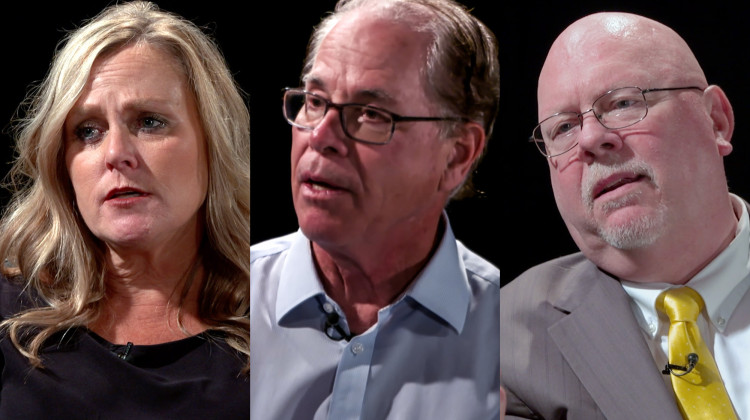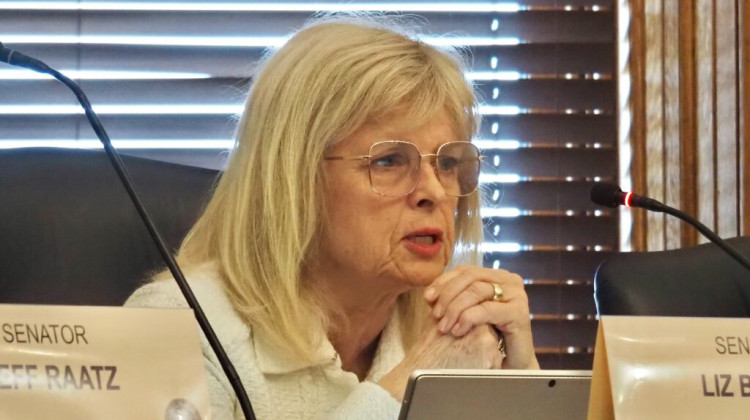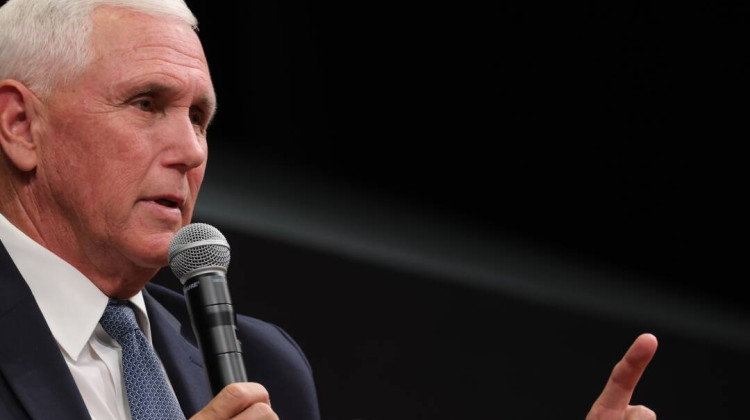
From left to right, Democrat Jennifer McCormick, Republican Mike Braun and Libertarian Donald Rainwater are the candidates for Indiana's 2024 open governor's race.
Alan Mbathi / IPB NewsIndiana’s gubernatorial race is sharply divided across policy lines, as Republican Mike Braun, Democrat Jennifer McCormick and Libertarian Donald Rainwater each cast very different visions for the future of the state.
Republicans have controlled the governor’s office for 20 years. But Braun’s message isn’t necessarily focused on continuity.
Rather, he said Republicans have become complacent — for instance, on addressing high health care costs.
“No one really wants to tackle health care,” Braun said. “It's the biggest part of our economy. They write a lot of political checks, all of that. I've got a track record where I can do it and I'm looking forward to it.”
Braun’s plan is focused on prevention and wellness — which McCormick notes is a major element of Gov. Eric Holcomb’s historic public health funding program.
“I commend Governor Holcomb and his team,” McCormick said. “I mean, that has been good for Hoosiers — but it's an expense. But we also need to look at it as an investment. So, what is a return on that investment?”
Emphasizing bipartisanship — whether by praising Republican-led programs or even adopting GOP policy proposals — is a major part of McCormick’s campaign. That makes sense, considering McCormick was a Republican when she served as state superintendent of public instruction.
That dynamic works right into Libertarian Donald Rainwater’s vision — disrupting the two-party system entirely, with a total shift in how government operates.
“I see things that are broken,” Rainwater said.
Take property taxes. All three candidates have plans for providing relief from high property tax bills. McCormick’s focuses on relief through state income taxes.
“Because we were very concerned about the local level funding,” McCormick said. “So, when you've got schools and libraries and police and fire and parks and the list goes on that are being funded through that, and I talked to enough local leaders, they were like, we can't sustain that.”
Braun’s puts a much greater burden on local governments.
“The bill is mostly about the feature of limiting increases in the future, because that's the complaint that everybody had, is their bills got skewed by things that happened federally that created inflation,” Braun said.
But Rainwater wants state and local governments to fundamentally change their priorities to accommodate a huge reduction in property taxes. A big part of that change — ending tax incentives used to lure big companies to Indiana.
“Not, ‘Oh, you're taking all our money away from us,’” Rainwater said. “No, I'm saying that we should take the money away that you're skimming off the top and giving to corporations at the expense of the citizens.”
READ MORE: What do I need on Election Day? The general election is Nov. 5
Join the conversation and sign up for the Indiana Two-Way. Text "Indiana" to 765-275-1120. Your comments and questions in response to our weekly text help us find the answers you need on statewide issues and the election, including our project Civically, Indiana.
Rainwater’s philosophy of upending the status quo also extends to education.
“I don't think that the 150 legislators at 200 West Washington Street should be making education decisions for the children in the state of Indiana,” Rainwater said. “I believe that should be parents, teachers, local school boards. I believe we need to decentralize education in the state of Indiana.”
If that philosophy is Rainwater’s biggest selling point to voters, McCormick’s is likely reproductive rights. She wants Indiana to undo its near-total abortion ban.
“The fact of the matter is this election's about we're either going to have a governor who trusts women or who does not,” McCormick said. “I'm the only candidate who has been pregnant and I've given a live birth. And I understand firsthand the complexities of pregnancy.”

Braun waves aside criticism of the ban, calling Indiana a “pro-life” state.
His selling point is his career building a small auto parts distribution business into a multi-million-dollar company.
“I'm going to try to fertilize a field of entrepreneurs,” Braun said. “Remember, I'm a main street entrepreneur that was a small business scrapping, scraping, just trying to do everything to survive for nearly half the time I ran it.”
Much of what decides a state-level race is influenced by national politics, something none of the candidates for governor can control.
But what they each hope is that the visions they’ve presented to voters can help them capitalize on whichever ways the political winds shift the race.
Brandon is our Statehouse bureau chief. Contact him at bsmith@ipbs.org or follow him on Twitter at @brandonjsmith5.
 DONATE
DONATE







 Support WFYI. We can't do it without you.
Support WFYI. We can't do it without you.